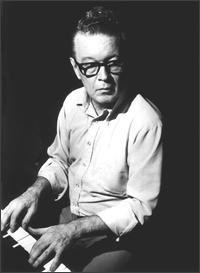Al Haig
| Al Haig | |
|---|---|
 |
|
| Background information | |
| Birth name | Alan Warren Haig |
| Born |
July 19, 1922 Newark, New Jersey, U.S. |
| Died | November 16, 1982 (aged 60) New York City, New York |
| Genres | Jazz, bebop |
| Occupation(s) | Musician |
| Instruments | Piano |
| Years active | 1944–1982 |
| Labels | New Jazz, Spotlite |
| Associated acts | |
Alan Warren Haig (July 19, 1922 – November 16, 1982) was an American jazz pianist, best known as one of the pioneers of bebop.
Haig was born in Newark, New Jersey. In 1940 he majored in piano at Oberlin College. He started playing with Dizzy Gillespie and Charlie Parker in 1945, and performed and recorded under Gillespie from 1945 to 1946, as a member of Eddie Davis and His Beboppers in 1946 (also featuring Fats Navarro), and the Eddie Davis Quintet in 1947, under Parker from 1948 to 1950, and under Stan Getz from 1949 to 1951. The Gillespie quintet, which included Haig, recorded four 78 r.p.m. sides for Guild Records in May 1945 which are regarded as the first recordings to demonstrate all elements of the mature bebop style. He was part of the celebrated nonet on the first session of Miles Davis' Birth of the Cool.
For much of the 1950s and 1960s, "Haig was all but a forgotten giant", in Brian Case's words; "Jazz pianism, ever more percussive in a crass simplification of [Bud] Powell's methods, had no room for the crystalline touch and swift, logical turnover of ideas. Haig got by with semi-cocktail piano in New York bars." Although Haig became known for his distinctive and pioneering bebop style, he in fact spent much of his career playing in non-jazz contexts. His work was the subject of a revival in the 1970s.
In 1969 Haig was acquitted of a murder charge. He had been accused of strangling his third wife, Bonnie, at their home in Clifton, New Jersey, on October 9, 1968. He had said in evidence that his wife had been drunk, and had died in a fall down a flight of stairs. Grange Rutan, Haig's second wife, challenged Haig's account in her 2007 book, Death of a Bebop Wife. Rutan's book is partly autobiographical, partly based on interviews with friends and family members. She describes Bonnie's story in detail, describing an underside to Haig that included a history of serial domestic abuse. Rutan notes that several family members sounded alarm bells regarding Haig's violent personality that went unheeded. She quotes bassist Hal Gaylor, who was talking with Haig before a performance at the Edison Hotel lounge in the early seventies, when Haig admitted to him he had caused Bonnie's death.
...
Wikipedia
